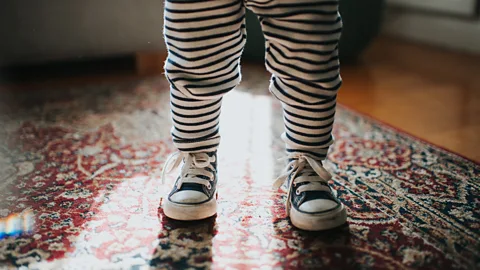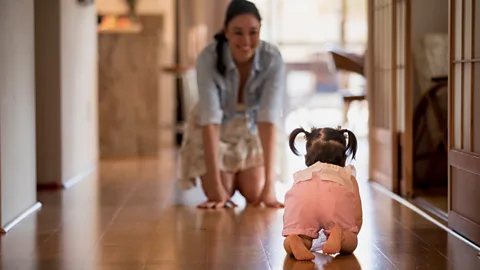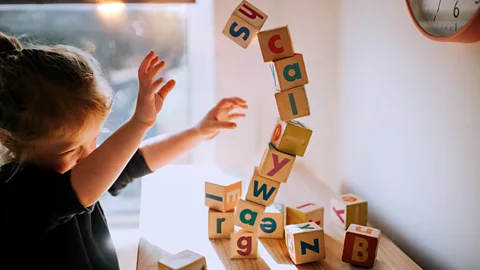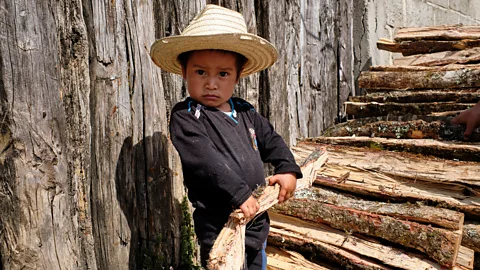What parents get wrong about childhood 'milestones'
 Getty Images
Getty ImagesDevelopmental milestones are an important medical tool – but is our obsession with them causing unintended harm?
Scroll through parenting feeds on social media, and you'll soon come across so-called milestone cards: pastel-coloured cards marking a baby's first attempt at crawling, sitting up, or walking, along with their age. It's not just on social media that developmental milestones have become something to celebrate – or stress over. One recent poll, for example, found that around six in 10 US parents worried about their babies meeting their developmental milestones. But few knew what should happen, when.
Other parents may take the opposite approach and pay little attention to the timing of new skills, trusting that a child will develop at their own pace.
Which raises the question: what is the point of milestones – and how should parents use them? Are they a crucial tool that can help us spot early on when something is off track? Or are they just another way for parents to "one-up" each other?
The answers depend, partly, on what exactly we mean by milestones. For a start, the reasons that healthcare professionals give for their importance can differ from parents' views.
"On a very concrete level, a milestone is a description of a behaviour of a child that parents either say their child can do, or cannot do," says Chris Sheldrick, a research associate professor at Boston University who focuses on paediatric screening protocols.
He points to the literal meaning of the word itself. If you're in a 10K race, at the 5K point, there might be a marker: a milestone. By definition, at the start of the race, no-one has passed it. By the end of the race, everyone has.
Checking an individual baby's progress along those markers can help healthcare professionals assess their development. But since parents know their child best, it can be a good idea for them to know roughly when babies tend to do things for the first time, experts say (though there are important caveats to the idea of typical development, to which we'll get later).
When parents take a very relaxed view of milestones – assuming that their child hasn't yet tried crawling or walking simply because they have a more laid-back personality, for example – they may be missing other explanations, healthcare professionals say.
 Getty Images
Getty ImagesFamily Tree
This article is part of Family Tree, a series that explores the issues and opportunities families around the world face today – and how they'll shape tomorrow. You might also like:
"There are absolutely kids whose personalities impact what they're willing to do. So they might be the ones that are trending towards that later side," says Kaitlin Rickerd, a paediatric physical therapist in New York. "But when it starts to fall outside of the ranges of where it can be expected, there's usually something that needs to be addressed. There's a reason, no matter how big or small it might be."
Developmental delays are common, experienced by one in six children in the US. A delay alone doesn't signify a medical condition – one review of 404 18-month-olds who weren't walking independently found that two-thirds had no underlying pathology, for example.
When there is an issue, though, intervening as young as possible is key. Delayed speech, for example, can be a signifier of autism, while late walking can be a sign of cerebral palsy. Spotting such differences early can help parents understand and support their child's unique development.
"We know that in the first three years of life, the amount of brain growth, the amount of learning, the amount of milestones that a child is acquiring is huge – which also means it's our best window to get in there and make a difference," says Rickerd.
But milestones are more than a tool for spotting underlying issues, she says. After working in paediatrics with older children, she realised a failure to master one skill might have caused a cascade effect. Take struggling to hold a pencil to write: it could relate to weakness in the arches of a child's hands, which could have been impacted by not weight-bearing as a baby, whether through crawling or tummy time, she says.
This professional view of milestones primarily as a screening tool differs from how some parents treat milestones in everyday life: as a predictive, sometimes competitive, indicator of ability or talent.
Indeed, there is some evidence that hitting certain milestones early can be indicative of a higher intelligence or attaining more education later. But, says Sheldrick, this is true across whole populations, not specific children. If there was a one-in-a-million chance of being a professional soccer player for a typically developing child, for an early walker, it might be one in 900,000, he says.
 Getty Images
Getty ImagesAnd pushing children to achieve milestones can backfire. There is some evidence that frequent use of baby walkers and jumpers can impede motor development, for example.
Even the metaphor of the race with each mile marked by a stone doesn't quite fit the complex reality of human development, Sheldrick points out. If you're watching a race, you know which runners are exactly 1K behind the 5K milestone. You can estimate when they'll hit it. Once they do, you know the exact moment it happened. And every runner who finishes the race will reach it at some point.
Developmental milestones don't offer this clarity. Nor are they a universal concept. Their interpretation and definition may vary considerably between cultures – and even individual families.
"A good example is 'Can your child walk?'," Sheldrick says. "What do you mean by 'walk'? Can your child walk a mile? Can they walk all the way to the well and back? Have they taken a few steps?"
This confusion is why new screening tools, like the updated milestones recently put out by the US Centers for Disease Control and Prevention (CDC) and American Academy of Pediatrics (AAP), try to use more specific wording.
Making it more complicated is that children develop very quickly. A child that isn't walking at 18 months might be running by 19. But if the child is only tested at 18 months, they might be identified as not being "on track".
Then there's the issue of measurement. How do you decide when something "should" happen? And what data is that based on?
The recent change to the CDC and AAP's milestones list highlighted many of these issues. For nearly 20 years, like many other official milestone lists, they based milestones on the 50th percentile – if 50% of children could do something by a certain age, that was the age for that milestone.
This meant that the other 50% of caregivers might worry unnecessarily. It also encouraged paediatricians to take a "wait and see" approach for children who hadn't hit a milestone, which sometimes backfired. "Parents of children with disabilities reported delays in identification because they were told to wait, that children develop differently, and that some take longer than others," researchers involved in the changes wrote.
As a result, in early 2022 the CDC moved its benchmarking to the 75th percentile. But the risk now runs the other way: with the ages set later, families might notice a child's delay later, too.
Then there's the question of where these expectations come from.
 Getty Images
Getty ImagesCultural differences
Historically, there's been relatively little data on large populations of children and milestones. In the 20th Century, psychologist Arnold Gesell pioneered quantifying motor milestones by observing babies from white, middle-class families from New Haven, Connecticut and describing their behaviour, movement and expressions over time. Since then, much of the evidence on milestones has been based on Western populations.
But early development can look very different in other cultures.
In Tajikistan, for example, it's common to swaddle babies as old as two and leave them in a cradle, even awake. Tajik children do acquire motor skills later than their Western counterparts. But they seem to show no long-term ill effects. On the other hand, in the Efe tribe of the Democratic Republic of Congo, babies as young as 11 months use machetes to cut fruit. Suffice it to say that's not on the CDC list – nor do we worry whether US babies can do this.
Parental expectations vary, too. One older study from 1997 found, for example, that while European-American parents thought children should feed themselves by 13.7 months, Puerto Rican parents did at 19 months.
Staff at Unicef recently experienced these cultural complexities first-hand. One of the UN's Sustainable Development Goals is that all children should be developmentally on track. As a result, Unicef had to develop an instrument that every country could use.
The question, says Unicef senior adviser Claudia Cappa, was, "Can we come up with something that is the equivalent of growth standards? Can we come up with a 'typical' child?"
The effort, which sprawled across than 200 national statistical offices, paediatricians, and child development experts, took five years. One of the biggest challenges was how to make the questions universal. In rural Mexico, for example, Unicef staff found they might get a blank look if they asked if a child could stack blocks. They had more luck when they asked if a child could stack firewood.
In one study highlighting the need for a cross-cultural perspective, the researchers are critical of the conventional view of milestones. "Motor milestones are millstones to a 'whole-child' approach to development," they write. "Motor milestones are only a perceived version of what is an important skill; they are cultural conventions, not universals."
Today, child development experts are often aware of these limitations – and they are trying to correct them. The CDC's updated list, for example, uses sources like a study of nearly 5,000 children in Argentina, India, South Africa, and Turkey. Still, the question remains: how much data, and how many cultures, need to be represented for a list of milestones to truly be "universal"? And is that even possible?
For parents, it might be worth remembering that milestones are meant to be helpful – not anxiety-inducing.
"Milestones are important. They're worth paying attention to," Sheldrick says. "If there's something that concerns you, I would follow up on it. But don't freak out."
Life, after all, is "long and complicated". And it's unlikely to be defined by whether you walked by 18 months, or 20.
---
Amanda Ruggeri is a freelance science and features journalist. You can find her at @amanda_ruggeri on Twitter.
If you liked this story, sign up for the weekly bbc.com features newsletter, called "The Essential List" – a handpicked selection of stories from BBC Future, Culture, Worklife, Travel and Reel delivered to your inbox every Friday.
